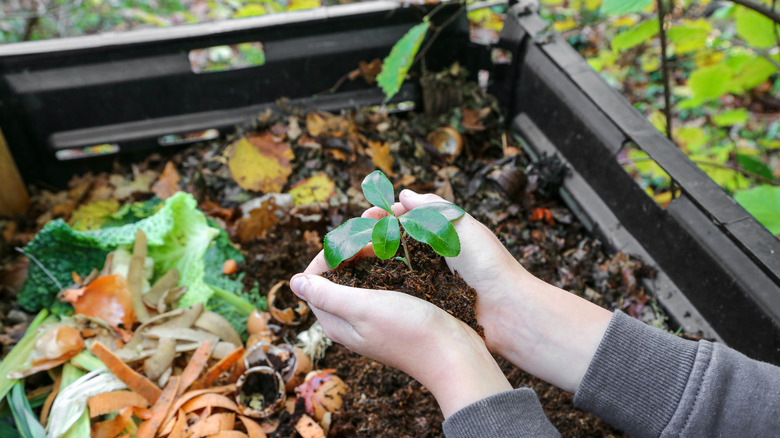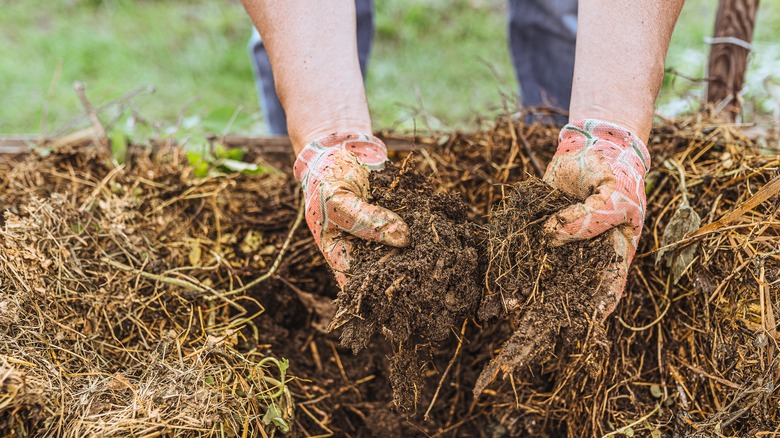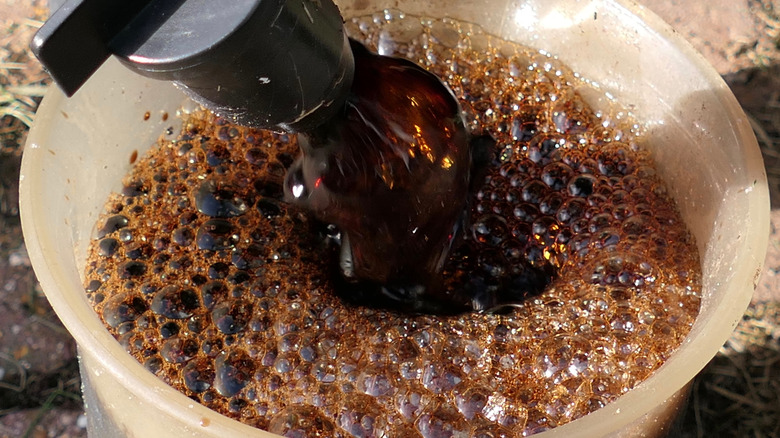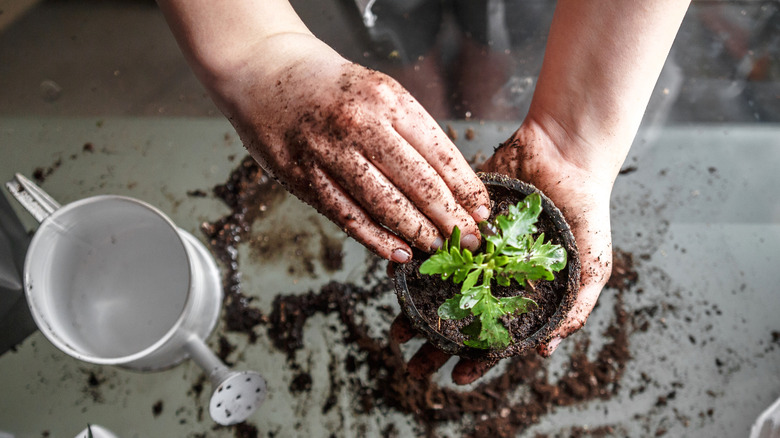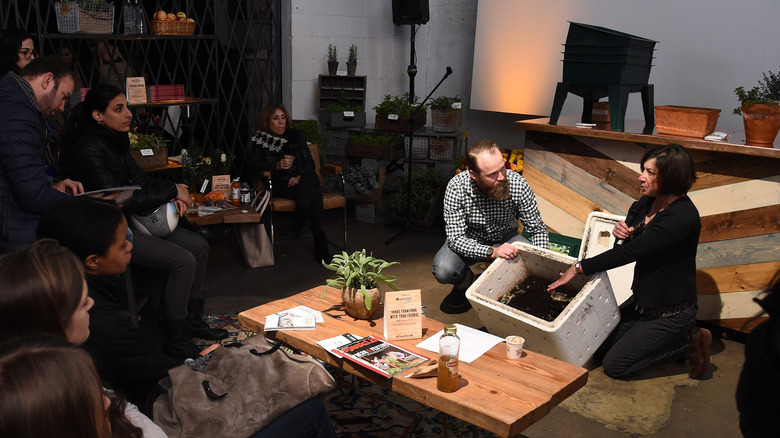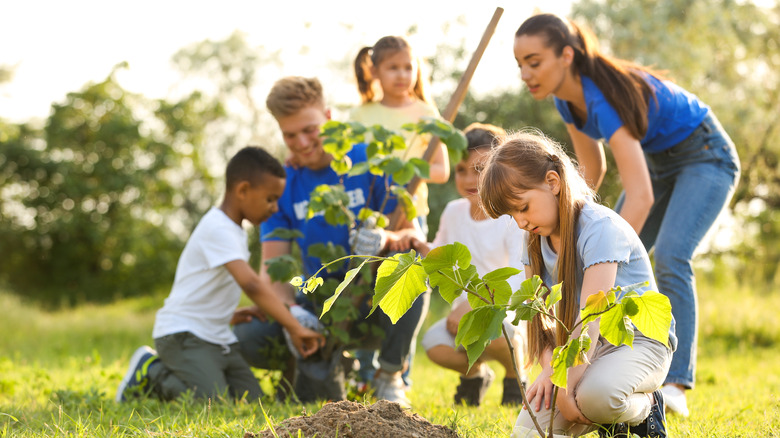What Can You Actually Do With Compost?
As our world continues to fight climate change, more and more people are eager to find ways to practice sustainability to make Earth a better place for all. According to a 2020 Pew Research Center study, "two-thirds of U.S. adults say the federal government is doing too little to reduce the effects of global climate change." So people are trying to watch their own footprint. However, it can become a bit overwhelming practicing environmentally friendly efforts such as eating plant-based, avoiding fast fashion, and recycling.
Chances are high that you have probably seen the word "composting" pop up at least once if you've searched for answers to questions about things like how to make your morning routine more eco-friendly online. So, what is compost? Merriam-Webster defines it as "a mixture that consists largely of decayed organic matter and is used for fertilizing and conditioning land." When you compost, you "convert (a material, such as plant debris) to compost." Depending on where you live, you can either compost indoors or outdoors. Gardens That Matter suggest multiple mediums for composting based on your interest and environment, but generally, there are three types of composting: aerobic, anaerobic, and vermicomposting.
Here's how you can reward Mother Nature and make the most out of your compost.
Compost is garden soil's best friend
By repurposing our food scraps, compost matter can be used in a plethora of ways that can be beneficial to our planet. After you've successfully chosen an option that works best for you, it's time to determine when compost is ready. Green Action Centre says you'll know your compost will be ready to use when "the finished product is a rich dark brown color, smells like earth, and crumbles in your hand."
If you feel that your compost has matured, it can take four weeks to 12 months to fully decompose (via Eartheasy), one of the most popular uses for those who enjoy gardening is to make mulch. According to One Green Planet, using compost as mulch adds nutrients and protects soil from potentially harmful weather conditions like water or wind.
To give your plants some extra love with composted mulch, Eartheasy recommends using a 3 to 6 inch-layer. Spread it until even, and watch your garden sprout happily as you celebrate giving extra love to your organic creations.
Make compost tea
No, unfortunately compost tea is not the kind of aromatic beverage you can drink. Still, the plants in your garden will certainly be gulping it down. Acting as a liquid fertilizer, compost teas are liquid versions of the solid compost material, the Rodale Institute states. They contain soluble plant nutrients and a complex community of beneficial microorganisms. You'll want to decide what compost tea your garden calls for — either aerated or non-aerated compost tea, with the latter being the more common option.
Before you gather all the materials needed to brew your compost tea, be mindful that the key to the best product will weigh on the quality of the compost (via SFGate). Once you're positive your compost has matured (SFGate also suggests that compost without any animal manure is optimal for avoiding soil-borne diseases), it's time to get to work. The Rodale Institute further explains that for non-aerated compost tea (most commonly used), you'll need a 6.5 gallon bucket with a lid, 5 gallons of water, 2-4 cups of mature compost, a mesh sieve that is 1/2" or smaller, and a long-handled instrument for stirring. For aerated compost tea, you'll need some more extensive equipment such as an aquarium air pump.
Whatever tea you decide to make, you'll be content knowing that you're making your own natural liquid fertilizer.
For non-gardeners, add compost to your indoor potted plants
If you don't garden or have an outdoor space, your compost can also be used as a DIY potting mix for indoor plants. The Minnesota Pollution Control Agency backs the idea of integrating compost into your own mixed soil creation to help spruce up your indoor or outdoor potted plants.
For the potted plants mix, the University of Florida, Institute of Food and Agricultural Sciences suggests the following ingredients: soil, builder's or coarse sand (for more air space to the mix), quality, nutrient-rich compost, pine bark, peat moss, coir, perlite (which helps with water drainage and could be used as a replacement for sand), and vermiculite (a lightweight mineral that improves soil aeration). The amounts of each will vary based on the kind of plant.
For instance, as the UF/IFAS writes, for succulents, the DIY mix would require 2 parts soil; 1 part peat moss; 1 part perlite; 1 part coarse sand. Or for just a general soil-based mix, they recommend 1/3 compost; 1/3 topsoil; 1/3 sand with vermiculite or perlite as a substitute for sand.
Sign up for a curbside compost service
Chances are that wherever you live, you're probably not the only one that's making the initiative to help the environment and reduce waste by composting. That's why it may be helpful to research areas in your neighborhood that offer services like curbside compost collection or compost clubs. According to Waste Today Magazine, more than 150 cities all over America have curbside collection programs for compostable food scraps. And it's easier than it sounds — all you or your business need are receptacles designed for compostable materials and compost-approved collectables such as food scraps or miscellaneous garden items like twigs or leaves.
Organizations like CompostNow provide lists of places in the United States and Canada that offer compost pickup services to make composting in your city easier. Although this option is a bit pricier since it requires a monthly fee, it's an excellent, efficient alternative to gardening with compost. By opting in for a service either for your home or workplace, you can help contribute to the reduction of food waste and build nutrient-rich healthy soil.
Similarly, companies like TerraCycle sell Zero Waste Boxes where eco-friendly consumers can purchase a bin for their organic matter compost waste to have it both collected and shipped for further recycling.
Donate your compost to nearby schools
When you compost, you're reaping many environmental, sustainable benefits. According to the United States Environmental Protection Agency, composting "reduces methane emissions from landfills and lowers your carbon footprint." So why not continue to give back in an interpersonal way by donating your at-home compost to a local school, preferably one with a community garden? In a report by Green Mountain Farm to School, when schools decide to set-up a community garden and actively compost, it helps close the gap of diverting food waste from landfills because the compost makes soil more nutrient-dense.
All it takes is making some calls to schools or community gardens near you. Another bonus is that most of the time, community gardens help free or low-cost quality produce to low-income people in the community (via One Green Planet). By donating your matured compost, you're making sustainable choices that will reap many benefits for you and your fellow community neighbors.
No matter what you decide to do with your compost, you'll help benefit not only the environment, but the economy, plants and gardens, and your community (via Pela). Talk about a win, win, win, and win situation!
